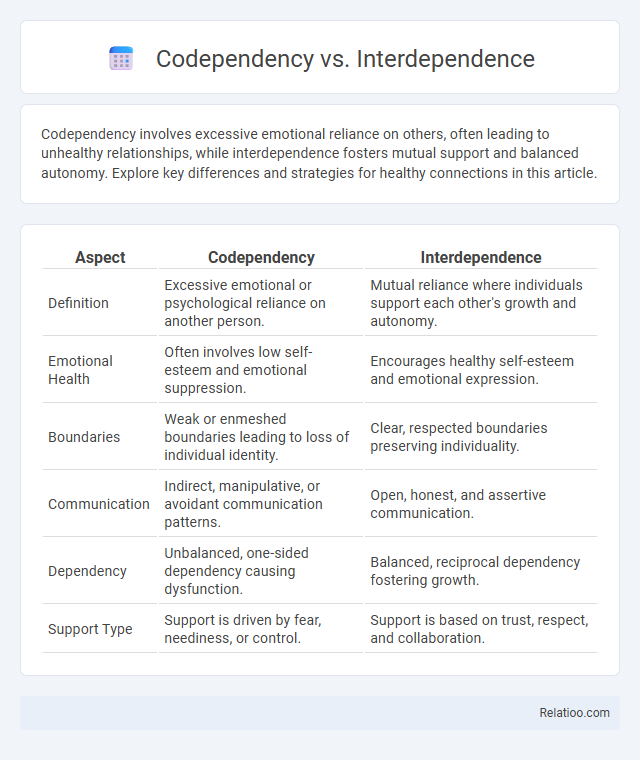Codependency involves excessive emotional reliance on others, often leading to unhealthy relationships, while interdependence fosters mutual support and balanced autonomy. Explore key differences and strategies for healthy connections in this article.
Table of Comparison
| Aspect | Codependency | Interdependence |
|---|---|---|
| Definition | Excessive emotional or psychological reliance on another person. | Mutual reliance where individuals support each other's growth and autonomy. |
| Emotional Health | Often involves low self-esteem and emotional suppression. | Encourages healthy self-esteem and emotional expression. |
| Boundaries | Weak or enmeshed boundaries leading to loss of individual identity. | Clear, respected boundaries preserving individuality. |
| Communication | Indirect, manipulative, or avoidant communication patterns. | Open, honest, and assertive communication. |
| Dependency | Unbalanced, one-sided dependency causing dysfunction. | Balanced, reciprocal dependency fostering growth. |
| Support Type | Support is driven by fear, neediness, or control. | Support is based on trust, respect, and collaboration. |
Understanding Codependency: Key Characteristics
Codependency is characterized by an excessive emotional or psychological reliance on a partner, often leading to a loss of individual identity and unhealthy sacrifice of personal needs. It involves patterns of enabling behaviors, where one person supports or encourages another's dysfunction, such as addiction or poor boundaries. Understanding codependency is crucial for recognizing how it contrasts with interdependence, which balances mutual support and autonomy, and boundariedness, which asserts clear personal limits and self-care.
Defining Interdependence in Healthy Relationships
Interdependence in healthy relationships means mutual reliance where both partners support each other's growth while maintaining individual autonomy and boundaries. Unlike codependency, which involves excessive emotional reliance and loss of self, interdependence balances connection with personal responsibility. Your relationships thrive when both parties communicate openly, respect limits, and collaborate without sacrificing individuality.
Emotional Boundaries: Codependency vs Interdependence
Codependency often involves blurred emotional boundaries where one's sense of self is entangled with another's emotions, leading to excessive caretaking and loss of autonomy. Interdependence features healthy emotional boundaries, allowing individuals to support each other while maintaining distinct personal identities and emotional self-regulation. Establishing clear emotional boundaries is essential to transition from codependency to interdependence, fostering balanced relationships based on mutual respect and individual well-being.
Communication Patterns: Enabling or Empowering?
Enabling communication patterns in codependency often involve excessive caretaking, unclear boundaries, and communication driven by fear of conflict or rejection, leading to reliance and imbalance. Interdependence fosters empowering communication marked by mutual respect, clear expression of needs, and collaborative problem-solving, which supports growth and autonomy for both parties. Boundariedness emphasizes assertive communication that clearly defines personal limits and responsibilities, enabling healthy interactions that prevent enmeshment while promoting emotional safety.
Self-Esteem and Personal Identity in Relationships
Codependency often undermines self-esteem and personal identity by fostering excessive reliance on others for validation, leading to blurred boundaries and emotional enmeshment. Interdependence promotes healthy self-esteem through mutual support and respect, allowing individuals to maintain distinct identities while collaborating harmoniously in relationships. Boundariedness reinforces personal identity by establishing clear limits that protect self-worth and encourage autonomy, ensuring relationships are balanced and grounded in self-respect.
The Role of Trust and Mutual Support
Trust serves as the foundation in differentiating codependency, interdependence, and boundariedness, shaping how individuals relate to one another. Your ability to establish mutual support while maintaining clear personal boundaries fosters healthy interdependence, promoting growth and emotional resilience. In contrast, codependency often involves blurred boundaries and reliance that undermines self-trust and autonomy.
Signs You Might Be in a Codependent Relationship
Signs you might be in a codependent relationship include an excessive need for approval, difficulty setting personal boundaries, and feeling responsible for others' emotions and problems. You may experience low self-esteem, prioritize others' needs over your own, and struggle with anxiety when alone or apart from the other person. Unlike interdependence, which involves balanced mutual support, or boundariedness, characterized by healthy limits, codependency often leads to emotional exhaustion and a loss of individuality.
Benefits of Cultivating Interdependence
Cultivating interdependence fosters mutual support, enhancing emotional resilience and personal growth by allowing individuals to rely on each other's strengths while maintaining autonomy. Unlike codependency, interdependence promotes healthy boundaries, preventing enmeshment and enabling balanced relationships where both parties benefit from shared responsibilities and trust. This dynamic enhances communication, increases collaboration, and encourages accountability, contributing to stronger, more fulfilling connections in personal and professional contexts.
Overcoming Codependency: Steps Toward Interdependence
Overcoming codependency involves recognizing unhealthy attachments and establishing clear personal boundaries to foster emotional autonomy. Developing interdependence requires mutual respect, open communication, and balanced support between individuals, promoting healthy relational dynamics. Emphasizing boundariedness ensures individuals maintain self-identity and prevent enmeshment, leading to empowered and sustainable connections.
Building Healthy, Balanced Relationships
Codependency involves excessive emotional reliance on a partner, often leading to imbalance and unhealthy attachment, while interdependence fosters mutual support and autonomy within relationships, promoting growth and respect for individuality. Boundariedness emphasizes setting clear, healthy limits that protect personal well-being and prevent enmeshment or control issues. Cultivating relationships with balanced interdependence and strong boundaries encourages trust, effective communication, and emotional resilience.

Infographic: Codependency vs Interdependence
 relatioo.com
relatioo.com